Coconut aminos (also called liquid aminos, coconut liquid aminos, or coco aminos) are a healthful flavoring ingredient that I keep in my pantry and use in a variety of recipes.
Coco aminos lend a punch of savory flavor, similar to soy sauce, fish sauce, or tamari. However, they contain a lot less sodium, which is why they’re such a common soy sauce substitute. In this post, I cover what coconut aminos are made from, their health benefits, how to use them in cooking, flavor substitutes, and my favorite brands.

What Are Coconut Aminos Made From?
Coconut aminos are a dark, thin sauce (similar to soy sauce or a thin teriyaki sauce) made from the sap or nectar of a coconut palm tree. Whereas coconut oil is made from mature coconuts, coco aminos are made from the sap of the young flowers of a coconut tree.
The unopened coconut blossoms are tapped, and their nectar is collected. The nectar is then fermented with salt. This fermentation process is what creates the savory, umami flavor dipping sauce known as coconut aminos.
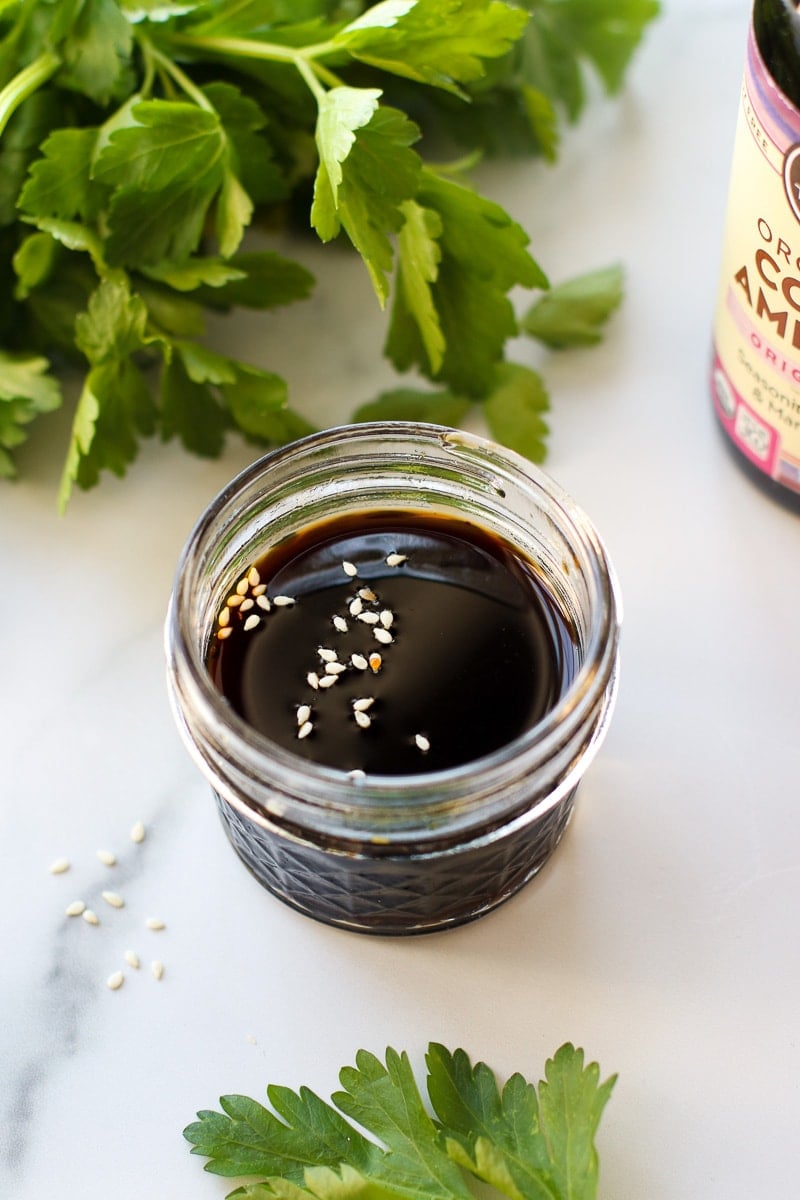
Health Benefits
I love to use coconut aminos as a soy sauce alternative for a few specific reasons, including the following health benefits:
- Made with whole foods: Coconut aminos are a seasoning sauce made from coconut sap and sea salt. Similar flavoring sauces often contain additives, such as thickening agents or chemical preservatives, MSG, added sugar, “natural” flavorings, or added colors; coconut aminos do not contain any of these extra additives and are free of refined sugars.
- Lower sodium content: Coconut aminos contain 70-75% less sodium than regular soy sauce, making it a better choice for individuals looking to reduce sodium intake for heart disease and blood pressure management.
- Soy-free and gluten-free: Coconut aminos are an ideal condiment for people with soy allergies or intolerances and those following a gluten-free diet, as they’re naturally free from both soy and gluten.
- Dietary-friendly: In addition to being gluten-free and soy-free, coconut aminos fit well within grain-free, vegan, nut-free, plant-based diets, as well as Paleo, keto, and Whole30 lifestyles.
- Rich in amino acids: Coconut aminos get their name from the amino acids they contain, which are the building blocks of proteins. Amino acids are essential for muscle repair, growth, and overall body function.
- Glycemic index: Coconut aminos have a lower glycemic index compared to many condiments, which means they may have a less significant impact on blood sugar levels. This is beneficial for individuals monitoring their glucose levels, managing diabetes, or following a low glycemic diet.
- Vitamins and minerals: Coconut aminos contain a range of vitamins and minerals, although they’re in small amounts. These can include potassium, vitamin C, and B vitamins, which contribute to various bodily functions such as maintaining healthy muscles, supporting the immune system, and producing energy.
- Antioxidant properties: While not as concentrated as in other food sources, coco aminos still contain antioxidants that can help combat oxidative stress and may reduce the risk of chronic diseases.
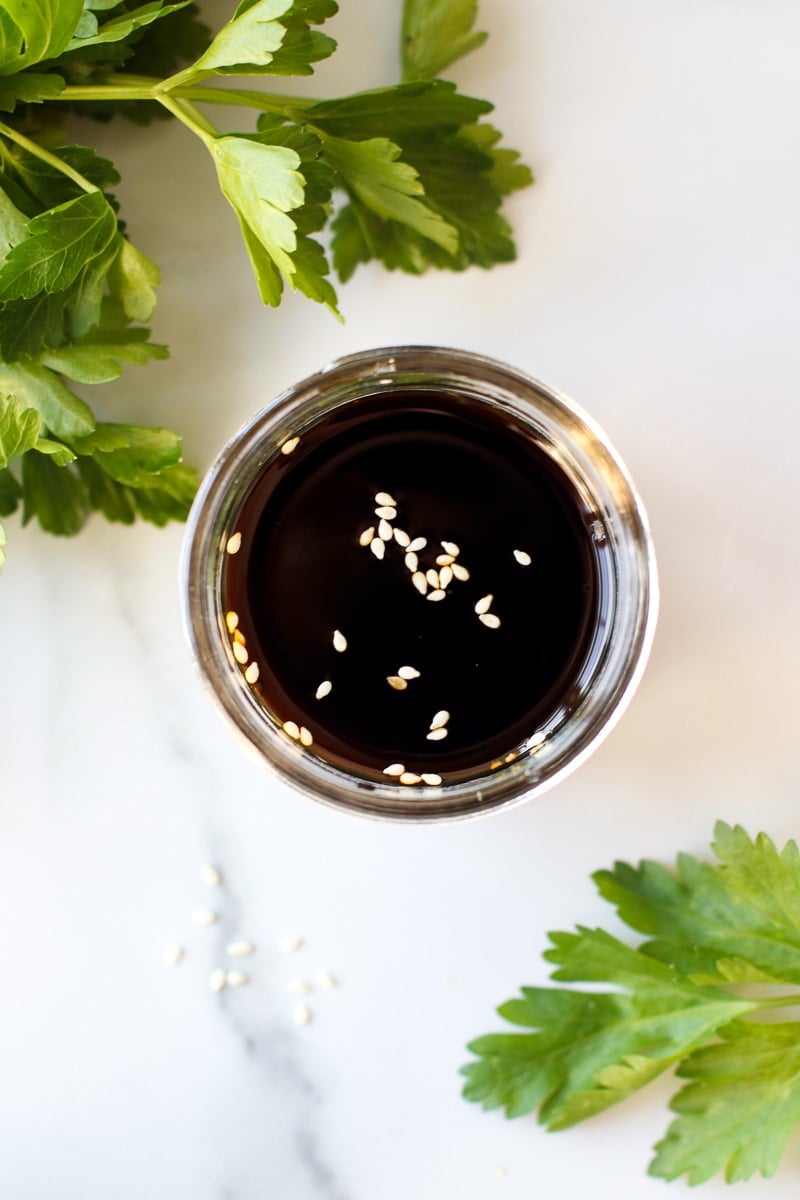
The Possibilities Are Endless
I love incorporating this flavorful low-carb condiment in a variety of dishes, from Asian-inspired recipes to everyday favorites. Some of the most common ways I use coconut aminos include:
- A dipping sauce for egg rolls, sushi, or spring rolls.
- A low-sodium alternative to soy sauce, tamari, or shoyu.
- A low-sodium, plant-based, and vegan alternative to fish sauce.
- A seasoning for fried rice or cauliflower fried rice.
- A drizzle over roasted veggies.
- A marinade for pork, chicken, shrimp, or steak.
- Stirring it into soups, stews, stir fry, or casseroles for a dash of umami flavor.
- Making it a component of homemade salad dressings or condiments, such as my homemade buffalo sauce.

Using Coconut Aminos As A Substitute In Recipes
When replacing soy sauce, tamari, or shoyu with coconut aminos, I usually double the suggested amount. For example, if a recipe suggests 1 tablespoon of soy sauce, I’ll use 2 tablespoons of coconut aminos instead.
On the other hand, if a recipe calls for coconut aminos but I want to use something else, I use half the amount of soy sauce, tamari, or shoyu mixed with an equal amount of water (e.g., a 50/50 ratio). So, if a recipe needs 2 tablespoons of coconut aminos, I can use 1 tablespoon of soy sauce mixed with 1 tablespoon of water.
Best Brands To Buy
I’ve been using coconut aminos for years now, and I’ve discovered my favorite brands based on taste and nutrition quality. Here are the 3 that are my go-tos and that I recommend to my friends and family the most often. I can buy these coco aminos on Amazon, at my local grocery store, or at one of the nearby natural food stores:
- Coconut Secret Organic Coconut Aminos: I use this brand most often because it’s the lowest in sodium. I love this brand’s fair trade and sustainable sourcing of non-GMO coconut products. One tablespoon contains 15 calories and 270 milligrams of sodium.
- Bragg Organic Coconut Liquid Aminos: This is my go-to brand for the best price and easy-to-find liquid organic coconut aminos. One tablespoon contains 30 calories and 420 milligrams of sodium.
- Big Tree Farms Organic Coco Aminos: I love this brand because it is organic, cleanly made, and tastes great. Plus, Big Tree Farms’ coconut aminos are crafted in small batches, which makes them stand out in quality, too. One tablespoon contains 25 calories and 490 mg of sodium.
Nutrition Facts
Per serving, typically one teaspoon (5 ml), of coconut aminos contains:
- 5-10 calories
- 1-2 grams of carbohydrate
- 100-200 milligrams of sodium
- 0 grams of fat
- Negligible amount of protein
Note that these serving size values will vary slightly by brand.
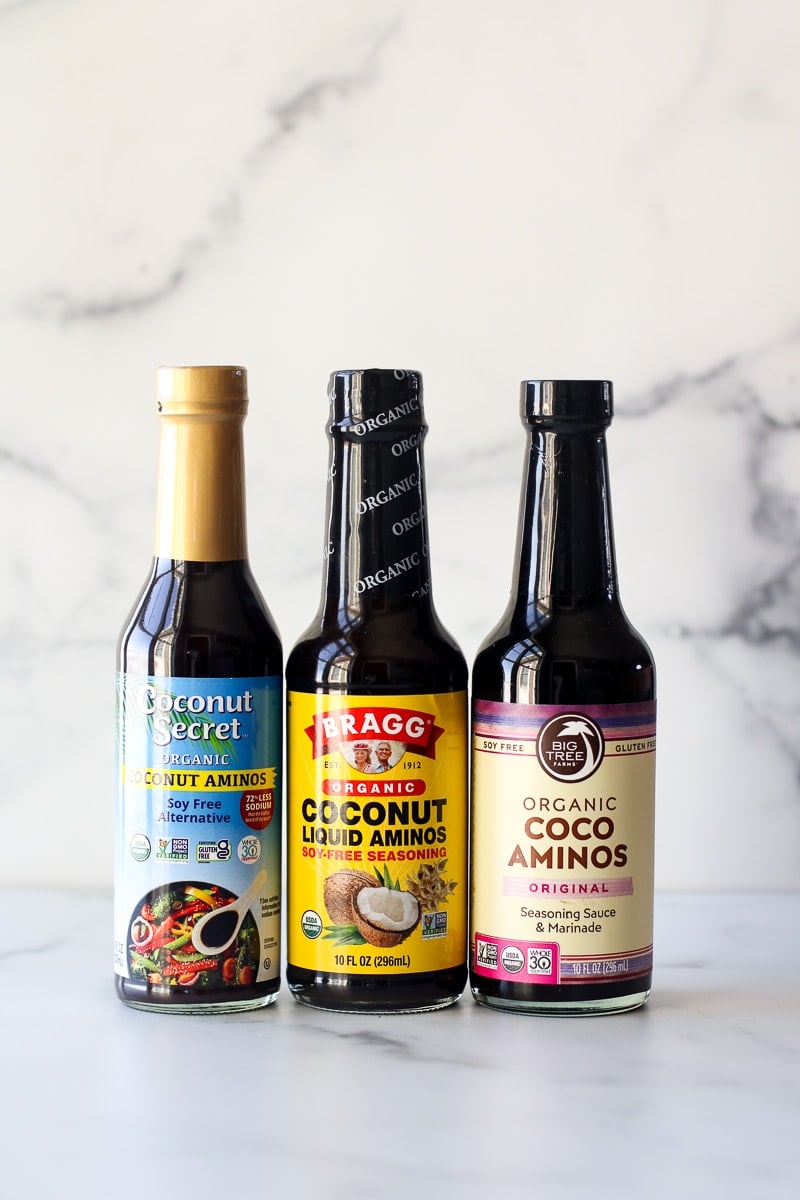
Frequently Asked Questions
Coconut aminos do not taste like coconut. Because of the name, a lot of people think that coconut aminos will have a coconut flavor, but that’s not the case. Coconut aminos look like a dark brown, thin liquid sauce. It is slightly salty and has a mild sweetness similar to low-sodium or mild soy sauce.
The main difference between coconut aminos and soy sauce is that coconut aminos are a lower-sodium, soy-free, and gluten-free alternative derived from coconut palm; soy sauce is made from fermented soybeans and wheat.
The sodium content in a tablespoon of coconut aminos is significantly less than in similar sauces:
1 tablespoon coconut aminos = 250 milligrams sodium
1 tablespoon tamari = 1,000 milligrams sodium
1 tablespoon soy sauce = 920 milligrams sodium
1 tablespoon shoyu = 880 milligrams sodium
1 tablespoon low-sodium soy sauce = 533 milligrams sodium
Note that these values could vary slightly by brand.
For ultimate success, we highly recommend reading the tips in the full blog post above. All photos and content are copyright protected. Please do not use our photos without prior written permission. If you wish to republish a recipe, please rewrite the recipe in your own unique words. Link back to the source recipe here on The Real Food Dietitians. Thank you!

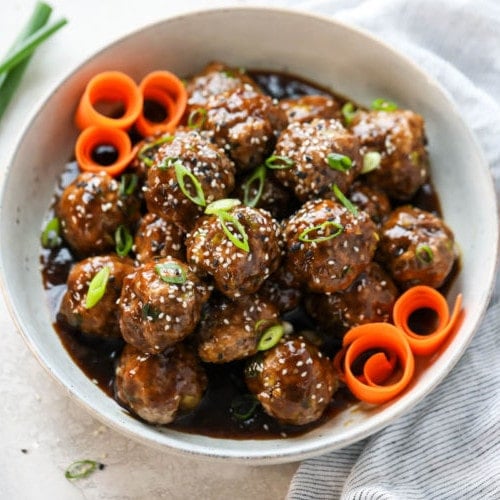
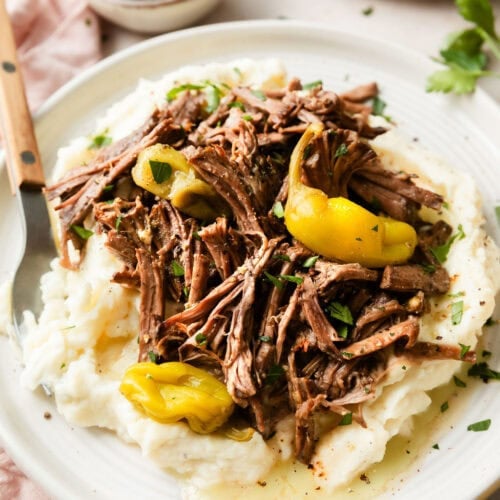

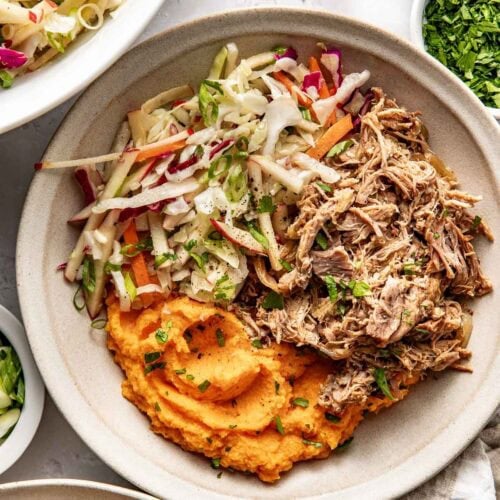
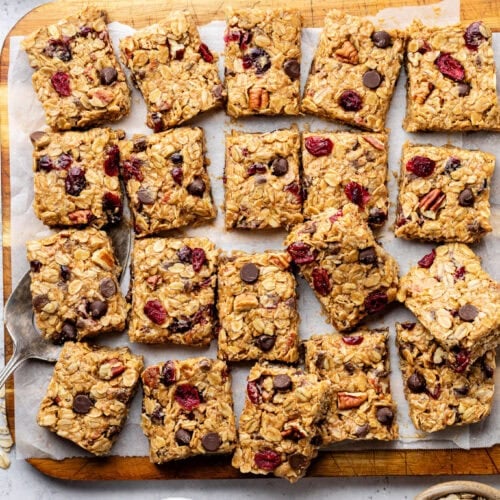
Are they good for you?
Hi Jess, coconut aminos can be a healthful alternative to other similar products, such as soy sauce, for the reasons we outline in the post.
In every recipe I have used coconut aminos instead of soy sauce, the flavor comes out so much more intense and over powering. I read multiple places to use double the aminos but its so thick and sweet, I can IMAGINE using 2xs as much! I am trying using 1/2 coconut aminos and half water with some extra salt to try and get it closer to soy sauce consistency and taste.
That’s a great observation and likely related to how your tastebuds and flavor receptors interpret the taste of coconut aminos. This is totally normal and everyone tastes differently – which is why the art of recipe creation is more of an art and less of science sometimes. We always recommend experimenting to see what you like best then going with that.
Very helpful information for a beginner using liquid aminos.
We are so happy to hear you found this helpful Ramona! Thanks for the feedback!
How much saturated fat is in coconut aminos?
Coconut aminos contain 0 grams of saturated fat per serving.
This is a fascinating tutorial on coconut aminos, which I had bought once for a recipe but never really understood. Given their good health profile I will plan to keep them in my pantry from now on!
We are so happy to hear it!